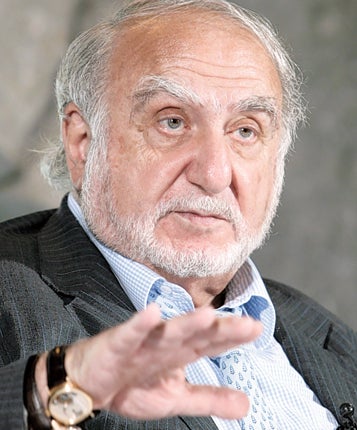Nicolas Hayek: Entrepreneur who created the Swatch brand and saved the Swiss watchmaking industry

The Lebanese entrepreneur Nicolas Hayek was widely regarded as the saviour of the Swiss watch industry when he founded Swatch. The inexpensive plastic Swatch watch went on to become a much sought-after and highly collectable piece, changing the way people thought about wrist watches.
Hayek, who headed his own business consultancy firm, was asked by a group of Swiss banks to oversee the liquidation of what remained of the troubled Swiss watch industry, which was going into meltdown and suffering from stiff competition from cheaper Japanese products. Instead he revived it by introducing the Swatch.
With brands like Omega, Tissot and Breguet under the Swatch Group umbrella, Hayek turned them into exclusive, "must-have" items for those who could afford them. "People buy these watches like others buy Picassos," he said. The Swatch Group now employs 24,000, has subsidiaries in 37 countries and more than 500 stores.
Nicolas George Hayek was born in Beirut in February 1928. His father, a dentist, was Lebanese, his mother Lebanese-American. When he was seven the family moved to Switzerland; he attended the University of Lyon in France, where he studied mathematics, physics and chemistry.
He then worked as an actuary for several years until, in the late 1950s, he set up a consultancy firm, Hayek Engineering, in Zurich. Initially he found himself having to pawn his family's possessions and take a bank loan in order to survive. Thereafter, his company grew in stature, advising on the re-structuring of AEG-Telefunken and Swiss Railways as well as a wide variety of international companies including Nestlé, Siemens and US Steel.
Hayek really made a name for himself when, in 1979, a government-appointed group of Swiss banks asked his firm to compile a report on the country's watch-making industry, with its two main manufacturers, ASUAG and SSIH, on the verge of bankruptcy. Essentially, the industry was still making traditional watches and had missed the boat on digitalisation in the 1970s, when suddenly everyone wanted to have quartz timing.
The Japanese had seized the opportunity with both hands and brands like Seiko and Citizen were leaving the Swiss floundering. Even film characters such as James Bond had ceased to wear Swiss in favour of Pulsar or Seiko digital: hands were out and digits were in. The banks wanted the industry sold off for as much as possible.
Undeterred and, perhaps, irrationally, Hayek ignored his brief and in 1982 decided to merge the two domestic industry leaders, taking a majority stake in the new group, now called Société Suisse de Microélectronique et d'Horlogerie, or SMH. He bought a 51 per cent controlling share in 1984.
Hayek's next move was audacious. With control of brands like Omega, Longines and Tissot plus the more exclusive Breguet and Blancpain, he announced a doubling of prices and, playing on the heritage value of the traditional industry, moved to emphasise the words "Swiss" or "Swiss Made" at the bottom of the dial. At once these traditional watches became more exclusive.
This was not enough, though: cash was needed. So with the help of two engineers, Elmar Mock and Jacques Müller, who had developed a quartz watch with 51 components (as opposed to 151 in the Japanese model), the SWATCH was developed and came on to the market in 1982. Using automated manufacturing techniques, the watch could be locally produced and sold for around £30. The success of the range of coloured watches was stunning: after a year in the global marketplace, sales totalled 1.1 million units, improving to more than 12 million by 1986. Stylish and affordable, Swatch had become a fashion accessory to be matched with shoes and clothing. It marked the first time that many consumers had actively thought about owning more than just one watch.
Swatch went from strength to strength, hiring guest designers, producing commemorative pieces and opening shops. By the decade's end it had become a global phenomenon. People slept on pavements outside stores the night before a new model went on sale; dedicated collectors bought them in pairs, one to wear and the other to keep pristine in its packaging. Soon auction houses recorded prices as high as $17,000 for rare models such as "Jellyfish" (original cost: $30). Hayek later ensured that Swatch-owned Omega, which had been the traditional time-keeper of the Olympics since 1932, regained its position from the Japanese Seiko, which was used in the 1992 Barcelona Olympics. "He was not from the watch industry," Mock said of Hayek, "but he had a vision of the vast potential of the project."
The affable and eccentric, pipe-smoking Hayek, sometimes wearing up to four Swatches per arm, did not limit the group's activities to watches. In the mid-'90s they started work on the Swatchmobile, which, after a link-up with Mercedes, became the Smart Car.
Although Hayek stepped down as chief executive of the Swatch Group in 2002, handing over the reigns to his son, he stayed on as president and remained active in the running of the company, which now sells 19 watch brands. In 2010, Forbes magazine ranked Hayek 232nd on its list of the world's billionaires, with assets valued at $3.9 billion. Last year the Swatch Group earned at least five billion Swiss francs. Nearly 500 years after watch production began in Switzerland, the rest of the world is still willing to pay a premium for its timepieces.
Martin Childs
Nicolas George Hayek, businessman: born Beirut, Lebanon 19 February 1928; married Marianne (two children); died Biel, Switzerland 28 June 2010.
Join our commenting forum
Join thought-provoking conversations, follow other Independent readers and see their replies
Comments
Bookmark popover
Removed from bookmarks